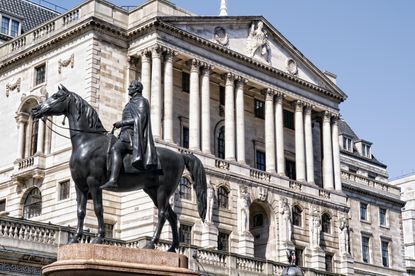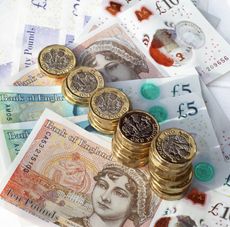Interest rates rise to 0.75%
Bank of England increases interest rate to 0.75% - the highest since the start of the pandemic


The Bank of England has raised interest rates to 0.75% as it warned the Ukraine conflict could see under-pressure households hit with double-digit inflation later this year.
It marks the third time in four months that the Bank has hiked rates.
The rate rise from 0.5% comes during a cost of living crisis, such as an increase in fuel and energy costs, with soaring inflation squeezing household finances.
Inflation is currently running at 5.5%, with big price increases seen at the petrol pump, in the supermarket and on many people’s energy bills.
This is well above the Bank of England’s inflation target of 2%. The Bank believes that inflation could reach 8% in the coming months, partly due to the war in Ukraine, which is pushing up “energy and other commodity prices including food prices”.
However, it also warned that if wholesale energy prices continue to soar, inflation could rise even further by the end of the year and potentially be “several percentage points higher” than the 7.25% peak that it forecast last month.
The Bank said: “The effects of Russia’s invasion of Ukraine would likely accentuate both the peak in inflation and the adverse impact on activity by intensifying the squeeze on household incomes.”
Look After My Bills Newsletter
Get the best money-saving tips, tricks and deals sent straight to your inbox every week. Make sense of your money in partnership with The Money Edit.
The Bank can raise interest rates to try and control inflation. Its Monetary Policy Committee (MPC) voted 8-1 to increase interest rates to 0.75%. The rise was widely expected by economists. However, rising mortgage costs for millions of households - as a result of higher interest rates - will hit them hard.
Annabelle Williams, personal finance specialist at the digital wealth manager Nutmeg, commented: “Although this is a small increase to interest rates which have been hovering close to record lows for many years now, many will be looking to see if the increase is passed on to consumers through higher savings rates.
“It’s a difficult time as people are finding more of their salaries eaten up by the rising cost of living, and those with variable-rate mortgages will likely feel the impact of the rate rise almost immediately.”
According to the financial website Moneyfacts.co.uk, none of the big high-street banks passed on the last two Bank of England rate rises to savers with easy-access accounts.
“As some of these rates are as low as 0.01%, it’s imperative savers reconsider their loyalty and switch away from these brands to something more attractive,” said Rachel Springall, finance expert at Moneyfacts.co.uk.
If a saver was lucky enough to have the 0.25% increase passed onto them, it would mean receiving £50 more a year in interest based on a £20,000 investment.
There are likely to be more interest rate rises from the MPC in the near future. The consultancy Capital Economics expects the committee to raise rates to 1% at the next meeting on 5 May, and for rates to peak at 2%, probably next year.
Additional reporting by PA
Ruth Emery is contributing editor at The Money Edit. Ruth is passionate about helping people feel more confident about their finances. She was previously editor of Times Money Mentor, and prior to that was deputy Money editor at The Sunday Times. A multi-award winning journalist, Ruth started her career on a pensions magazine at the FT Group, and has also worked at Money Observer and Money Advice Service. Outside of work, she is a mum to two young children, a magistrate and an NHS volunteer.
-
 Three energy firms pay £8m in switching compensation - has your provider paid out?
Three energy firms pay £8m in switching compensation - has your provider paid out?More than 100,000 customers have received compensation after changing providers, but is now a good time to switch energy suppliers?
By Tom Higgins Published
-
 Save £300 on your supermarket shop with cashback accounts
Save £300 on your supermarket shop with cashback accountsBanks, credit card companies and cashback sites are all offering cashback on your supermarket shop, but can you use them all to max out your savings?
By Vaishali Varu Published
-
 Save £300 on your supermarket shop with cashback accounts
Save £300 on your supermarket shop with cashback accountsBanks, credit card companies and cashback sites are all offering cashback on your supermarket shop, but can you use them all to max out your savings?
By Vaishali Varu Published
-
 More than 150,000 grandparents missing out on £1,500 state pension uplift: how to claim
More than 150,000 grandparents missing out on £1,500 state pension uplift: how to claimGrandparents who provide childcare by looking after their grandchildren could be missing out on valuable state pension money worth thousands. We look at how much extra you could get and if you’re eligible
By Stephanie Baxter Published
-
 Can you reclaim bank charges?
Can you reclaim bank charges?If you’ve incurred bank charges over the years, these can add up to hundreds of pounds – but can you get your money back? We look at whether you can make a claim and how to do it
By Stephanie Baxter Published
-
 HSBC extends deadline for customers to secure bigger interest-free overdraft
HSBC extends deadline for customers to secure bigger interest-free overdraftHSBC customers now have until 10 May to increase their interest-free overdraft limit from £25 to £500. First Direct, Lloyds and Nationwide also offer similar support. We explain everything you need to know
By Katie Binns Last updated
-
 New banking hub locations revealed - is there one near you?
New banking hub locations revealed - is there one near you?The rise of banking hubs is in response to a stream of local branch closes. With more planned to launch soon, we look at what services they offer and where you can find one
By Stephanie Baxter Published
-
 April 2023 premium bond winners revealed - are you a millionaire?
April 2023 premium bond winners revealed - are you a millionaire?Two premium bond holders have won £1 million each this month and there are many other prizes for another 5,018,742 winners in April. We look at how to find out if you’ve won
By Stephanie Baxter Published
-
 Get more for your money with a stocks and shares ISA
Get more for your money with a stocks and shares ISAA stocks and shares ISA could grow your money faster than a cash ISA. But what is it exactly and who is it suitable for?
By Ruth Emery Published
-
 Help to Save scheme extended – act now for £1,200 bonus
Help to Save scheme extended – act now for £1,200 bonusThe government has extended the Help to Save scheme - we explain how it works and who is eligible
By Kalpana Fitzpatrick Last updated